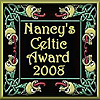| |

Traditions, folklore, history and more. If it's Irish, it's here. Or will be!
"People will not look forward to posterity who never look backward to their ancestors."
-Edmund Burke




Quotes
Library: Books, Movies, Music
Prints & Photos
Poetry
Jokes


Shops Ireland
Bunús na Gaeilge
(Basic Irish)
Circle of Prayer
Blessings
Did You Know?
Himself/Herself
Write to Us
Readers Write..
Links/Link to Us
Advertise with us
Awards & Testimonials
Submissions Guide


|
|
|
 Old Days, Old Ways - Brehon Law Old Days, Old Ways - Brehon Law
by Bridget Haggerty
Imagine a culture where it was the law that whoever comes to your door you must feed them and care for therm with no questions asked. A place where there was no police force. Where there were no prisons. Where fairness was revered. Where the ultimate community goal was to live in peace and harmony. And where even the consumption of alcohol was addressed: A Layman may drink six pints of ale with his dinner but a monk my drink only three pints. This was so he would not be intoxicated when prayer-time arrives. The culture was not an imaginary Utopia - it was Ireland long before the arrival of St. Patrick.
The Emerald Isle once had its own unique judicial system which survived until the 17th century when it was supplanted by English common law. This native system, known as the Brehon law, was developed from customs which had been passed on orally from one generation to the next and was administered by Brehons who were the successors to the druids. While the word Brehon means judge in Irish, the role of the Brehon was closer to that of an arbitrator. Their task was to preserve and interpret laws, not make them.
 It wasn't until the 7th century that the laws were written down for the first time on parchment. Inscribed in the oldest dialect of the Irish language and in an elliptical style that was very difficult to understand, no-one but the Brehons themselves were able to read them. However, in 1852, two Irish scholars, Eugene O'Curry and John O'Donovan, took on the task of translating the surviving manuscripts. They were able to accomplish their translation only after a life-long study and in numerous instances were, to the last, not quite sure of the meaning. It is imperfect for another reason: it was only a preliminary and provisional translation, containing many imperfections and errors, to be later corrected; but the translators did not live to revise it. That said, their translation was invaluable from the perspective of learning about Ireland's social history. It wasn't until the 7th century that the laws were written down for the first time on parchment. Inscribed in the oldest dialect of the Irish language and in an elliptical style that was very difficult to understand, no-one but the Brehons themselves were able to read them. However, in 1852, two Irish scholars, Eugene O'Curry and John O'Donovan, took on the task of translating the surviving manuscripts. They were able to accomplish their translation only after a life-long study and in numerous instances were, to the last, not quite sure of the meaning. It is imperfect for another reason: it was only a preliminary and provisional translation, containing many imperfections and errors, to be later corrected; but the translators did not live to revise it. That said, their translation was invaluable from the perspective of learning about Ireland's social history.
Brehon law unveils an Irish society in which many modern concepts such as women's rights were already well established. It recognized divorce and equal rights between the genders. and in criminal cases, offenses and penalties were defined in great detail. Restitution rather than punishment was prescribed for wrongdoing.
 In very early times the Brehon was regarded as a mysterious, somewhat inspired person, and a divine power kept watch over his pronouncements to punish him for unjust judgements. Legend has it that The great Brehon, Morann, son of Carbery Kinncat (king of Ireland in the first century), wore a collar round his neck, which tightened when he delivered a false judgement, and expanded again when he delivered the true one. This rings accurately with the whole tenor of Irish literature, whether legendary, legal, or historical, which shows the great respect the Irish had for justice and their abhorrence of unfair decisions. In very early times the Brehon was regarded as a mysterious, somewhat inspired person, and a divine power kept watch over his pronouncements to punish him for unjust judgements. Legend has it that The great Brehon, Morann, son of Carbery Kinncat (king of Ireland in the first century), wore a collar round his neck, which tightened when he delivered a false judgement, and expanded again when he delivered the true one. This rings accurately with the whole tenor of Irish literature, whether legendary, legal, or historical, which shows the great respect the Irish had for justice and their abhorrence of unfair decisions.
Essentially, Ireland's ancient judicial system formed a great body of civil, military, and criminal law. It regulated the various ranks of society and enumerated their rights and privileges. It clarified the relations of landlord and tenant, the fees of professional men, the mutual duties of father and son, of foster-parents and foster-children, and of master and servant All were carefully regulated. And in that portion corresponding to what is now known as criminal law, the amount of compensation was laid down in great detail for almost every possible variety of offense, from murder to accidental injury.
The Irish delighted in judgements delivered in the form of a moral, or an apt illustration - some illustration bearing a striking resemblance to the case in question. The jurist who decided a case by the aid of such a parallel was recognised as gifted with great judicial wisdom, and his judgement often passed into a proverb. Thus we still have gems such as "Many a time a man's mouth broke his nose". "Everyone is wise until he speaks". and "A diplomat must always think twice before he says nothing."
 We began this brief look at the unique judicial system in ancient Ireland with a few examples. It would seem appropriate to end it with a few more. Of these examples, Some are odd. Many seem archaic. But in general, many demonstrate a society that was more progressive than it is today. The harpist is the only musician who is of noble standing. Flute players, trumpeters and timpanists as well as jugglers, conjurers, and equestrians who stand on the back of horses at fairs, have no status of their own in the community, only that of the noble chieftain to whom they are attached. We began this brief look at the unique judicial system in ancient Ireland with a few examples. It would seem appropriate to end it with a few more. Of these examples, Some are odd. Many seem archaic. But in general, many demonstrate a society that was more progressive than it is today. The harpist is the only musician who is of noble standing. Flute players, trumpeters and timpanists as well as jugglers, conjurers, and equestrians who stand on the back of horses at fairs, have no status of their own in the community, only that of the noble chieftain to whom they are attached.
The creditor who holds a brooch, or other jewelry as a pledge against a loan must return them so the owner may wear them at the great assembly or he will be fined for humiliating his client. As with many cultures, the Irish dreaded losing face and this type of penalty was known as a 'blush fine'
Husband and wife retain individual rights to all land, flocks and household goods each brings to the marriage.
A husband who through listlessness does not go to his wife in her bed must pay a fine.
If a pregnant woman craves a morsel of food and her husband withholds it through stinginess or neglect he must pay a fine.
A son was required to take care of his parents; if he did not, he risked losing his inheritance
No fools, drunks or female scolds are allowed in the doctor's house when a patient is healing there. No bad news to be brought and no talking across the bed. No grunts of pigs or barking of dogs outside.
If the doctor heals your wound but it breaks out anew because of his carelessness, neglect or gross want of skill he must return the fee you paid. He must also pay you damages as if he himself had wounded you.
The cook in a nobleman's kitchen is not responsible for splashing the broth on those at the fire if he gives a warning in a loud voice " look out - here goes the fork into the cauldron".
A cow must not be exposed to wild dogs or pirates.
The lender of a horse must give notice of the horse's kicking habits.
 Resources: Resources:
Main Image: AOH Florida State Board
Brehon Text: The Awen magazine
Brehons: Imagine 2015
Content:
Ancient Order of Hibernians Florida State Board
Courts Service Ireland
The Lost Laws of Ireland by Catherine Duggan
While some Brehon Laws might seem antiquated to today's Dayton criminal defense attorney, there is no doubt any attorney would appreciate the detailed system of fines and penalties.
|
|
Fri, Sep 27, 2024
 The Galway Hooker The Galway Hooker
This unique vessel, with its distinctive curved lines and bright red sails, originated in the village of Claddagh. During the 19th century, hookers supported a significant fishing industry and also carried goods, livestock and fuel. Seán Rainey is remembered for building the last of the original boats, the Truelight, for Martin Oliver who was to become the last king of the Claddagh; as king, he was entitled to white sails on his boat. Since the mid seventies, many of the old sailing craft which were on the verge of extinction have been lovingly restored and new ones have been built. During the summer months they can be seen at festivals such a Cruinniú na mBád - the Gathering of the Boats - in Kinvara.
Click for More Culture Corner.
|




 The Galway Hooker
The Galway Hooker